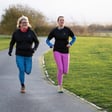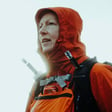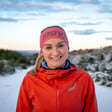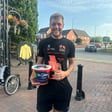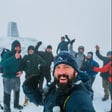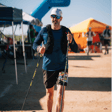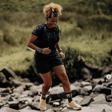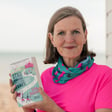Introduction and Guest Background
00:00:01
UKRunChat
Welcome to the UK Run Chat podcast. I'm Michelle and today's guest is someone you wrote you'll remember from a previous episode, Steve Till. Last time we talked about his remarkable running journey from his Olympic dreams sparked in 1971 to GB ultra distance podiums to his park runs, over 600 of them.
Facing Lymphoma: Diagnosis and Initial Treatment
00:00:22
UKRunChat
Today, we're taking a deeper and more personal turn because over the past year, Steve has undergone treatment for lymphoma, including chemotherapy and a stem cell autographed.
00:00:34
UKRunChat
Now, in the face of all that, running's remained a kind ah constant. So that's what we'll be chatting about today, how running has helped him navigate perhaps the biggest challenge yet. and Hi, Steve. Thanks so much for coming back on and talking about something so, so personal and so recent as well.
00:00:49
Steve
Yeah, thank you very much. um Yeah, I'm very glad of ah the opportunity to share my experience because I think, well, I know from it i know from my own experience already that it is, um you know, helpful ah for people to hear that there is um um a positive side or you can take a positive approach, shall we say, ah if possible.
00:01:07
UKRunChat
yeah Yeah, well,
Running Through Treatment: A Source of Strength
00:01:10
UKRunChat
you very kindly shared parkrun blog with me that you you recently wrote, didn't you, in May.
00:01:15
UKRunChat
and So that's been very helpful. So yeah, it'd be really nice to chat today. And maybe you can kind of help others who are perhaps going through similar or have friends that they can support through it as well. and So let's just start kind of at the beginning then. So how how did the lymphoma diagnosis come about? And, you know, when did that happen? What was going through your mind as a runner?
00:01:38
Steve
yeah um Well, as a runner, I mean, I'm quite robust. I i didn't get any of the childhood um illnesses that everybody gets, measles and mumps and things. And um and as as a runner, you you trust your body, don't you? You you don't expect it to to let you down or you you hope it won't let you down.
00:01:56
Steve
um But yes, early last May, May 2024, I got a terrible itch all over my body, which was... and unbearable really. um And it's swiftly progressed into a very angry rash. um So obviously, I went to the doctor loads of tests.
00:02:16
Steve
um Was it um an allergic reaction? And and By the middle, towards the end of May, it was either, the doctors said it was either an allergic reaction or it could be um lymphoma, which is what it turned out to be.
00:02:33
Steve
um So on the 29th of May last year, I was diagnosed with lymphoma. um I have to write this down because I can never remember it. Angioimmunoblastic T-cell lymphoma stage There you go.
00:02:48
UKRunChat
That's quite a scary thing hear.
00:02:50
Steve
yes yes yes it is um but that was the 29th of may two days later i had my first uh chemo so the and nhs were fantastic i mean it was so quick um from diagnosis to the first chemo and with the first chemo um came almost 90 percent uh relief of the itch and uh the rash so that was great um i can remember saying to my consultant one point
00:03:18
Steve
I don't really care if I've got cancer or not, just get rid of this blooming itch because it was so awful.
00:03:23
Steve
um i mean, obviously did care whether I had cancer, but anyway.
Balancing Treatment with Activity: Medical Insights
00:03:27
Steve
um Yeah, so leading on to the running, um so the diagnosis was on 21st of may which is a wednesday the chemo was on the 31st of may which is a friday so obviously being me my one of my first thoughts was um should i do park run tomorrow um would it be a good idea you know um and i'd obviously talk to the consultant about um the fact that i run and would it be a good idea and she was she was quite ah risk averse. She was sort of, well, don't do too much and keep yourself away from people. You will be ah vulnerable. You'll be open to infections and all sorts of things during the chemotherapy, et cetera, et cetera.
00:04:10
Steve
um When I talked to the specialist nurses, um they took a rather different approach. um They said, you've got to live your life um and you can't um Let your life be just about the cancer. And that that really struck with me. And and that was something I've um carried with me. And I've said to other people as well, don't let your days just revolve around the fact that you've got cancer. you know um Put other value into your days. So so um Going back to the 31st of May when I had the chemo, I thought, yes, I will do parkrun tomorrow. I'll be sensible. I'll stay away from people. I'll start at the back. I'll walk around.
00:04:48
Steve
I won't put ah pressure on myself to you you know do a time, obviously, or anything like that. But I felt for my... not not really my physical well-being, but my mental and emotional well-being. It was important, as I say, to make my life about more than just the cancer.
00:05:04
Steve
And I felt that if I could do a park run, that was a bit of value in my life, in my day, if you like. um And I felt that was important. And and once i'd done that it became well i did it every week um every week i went to parkrun um and um it was a it was a big thing it was a real kind of peg um in the week um that i you know clung on to and i felt gave my um life a bit of meaning a bit of um as i say value
00:05:37
Steve
um And the chemotherapy was on a three-week cycle. So the middle week, I would be most vulnerable and most weak. So um those weeks, I would just walk around at the back as slowly as I needed to.
00:05:51
Steve
The other weeks, I could, um as time went on, I could run a little bit. So I would jog and walk. So I'd do a bit faster um than the...
00:06:02
Steve
the middle week. And so I went on six rounds of ah chemotherapy over 18 weeks. um And every week I did a park run, um which
00:06:15
Steve
which I was very pleased to be able to do. And um Yeah, and I ah didn't share my ah situation with many people, but a few at my parkrun knew about it and they were very ah supportive.
00:06:30
Steve
and Yeah, so that was how it started out, if you like. That sort of conversation I had with myself on that first Friday when I had the chemotherapy, it was sort of like, right, is it sensible to do parkrun tomorrow?
00:06:46
Steve
And as I say, I came to the conclusion that For me, yes, it was. yeah
00:06:51
UKRunChat
Yeah. Well, you wrote in the park room blog that I just mentioned that it was but running was crucial to your treatment. Can you just talk a little bit more about how, how, like how it, it helped you?
00:07:04
Steve
Yes. I mean, i I think the main point is... um Well, let me go back a bit. when when i When I got the lymphoma and in the in the first sort of week or so, obviously I did a lot of thinking.
00:07:17
Steve
This is is is very new. It was still completely out of the blue.
00:07:20
Steve
And as I say, it's the first... serious illness I've ever had. um So it it obviously
The Role of Exercise in Recovery and Mental Strength
00:07:28
Steve
knocked me. um And I felt that I came to the conclusion there were four things I wanted to do um in the time that I had ah lymphoma. and And I felt that um I wanted to try and ah be brave and set a good example, particularly for um ah my children.
00:07:49
Steve
um So that was one thing I wanted to carry on working if I could. So I, I, I write stuff. and So I wanted to carry on writing because there's still a lot more I want to say about running in particular.
00:07:59
Steve
um So that was the second thing. um The third thing, which may sound a bit funny was I wanted to have good conversations. Somehow having lymphoma brought out the ah humanity in me, um which my friends will tell you was very well hidden up to that point.
00:08:14
Steve
So, But somehow i I found myself when I had an lymphoma, I would ah something inside me said, you know, be nice to people, let people out of side roads when when you're when you're in in your car, you know, um sort of small things like that. I felt that.
00:08:33
Steve
I wanted to do my my bit to make the world a nicer place. um I don't know. I haven't still haven't quite worked out ah the logic of that. um You know, why why does cancer make you do that? And I suppose because when my life was sort of threatened, I would try and make other people's lives better. I don't know. It's it's it's complex. So those were the first three things. and Continue with my writing. Be a good example. Have a good conversation. And the fourth thing was exercise.
00:09:01
Steve
what what exercise could I do I knew I couldn't run marathons. I knew I couldn't run very far or very fast, um but I thought what was what was sensible. And so park run, obviously, and and during the week i would I would run too. So I would run um two or three times during the week, not very far, not very fast.
00:09:19
Steve
And I would do a park run at the weekend. And that, those, um as I say, milestones, if you like, in my week gave me purpose, gave it, gave my days meaning, um, meant that I was, um, uh, physically active, um, that my you know body was having more poured into it than just the chemotherapy.
00:09:42
Steve
It was having all these good, all this good stuff, um, that, uh, running does for us pulled into it. Um, so yeah, I, I felt that was, uh, very important.
00:09:53
Steve
And, um, I mean, I've been on lymphoma, um ah chats and i know that I'm lucky and my consultant said, you know, you are fit and so this will stand you in good stead.
00:10:08
Steve
And I know other people who are in the same situation as me, who perhaps haven't been um as physically active as I have over the years, um they they struggle a lot more. and And I've been on lymphoma Zoom chats where um You know, people have said I struggled to get from the sofa to the kettle. And, um you know, my heart goes out to them.
00:10:30
Steve
um And sometimes I don't like to say, well, I ah ran three miles this morning, you know, because.
00:10:35
Steve
ah But yeah, so so continuing. The running that was so much such a big part of my life. has been such a big part of my life for over 50 years continuing that through the cancer was so important absolutely crucial um to my feeling of self-worth which obviously pours into um your positive feeling about i will get through this you know i mean people say don't they that um with cancer more than any other
00:11:09
Steve
challenge illness situation that that we're faced with a positive mental attitude is absolutely crucial can make a huge difference and I think that's absolutely true. um I try to go into each chemotherapy session with a smile and you know say hello to the nurses and everything and if you go in with a smile those needles hurt less. okay
00:11:30
Steve
It's absolutely true I'm a great believer that you know we're ah we're a continuum we're we're not as separate um mind and body, it's all it's all connected. and And we know as as runners that that each run is ah is a battle between ah the body saying, I want to stop, I want to stop, and the mind saying, no, I want to continue. I want i want to get to five miles. i want to continue I want to finish this marathon. I want to run a mile without stopping. I want to, you know, all that sort of stuff.
00:11:53
Steve
um and and And I think that, as I say, if if you go into cancer in general and the chemotherapy sessions in particular with a positive mental attitude, then it can make a huge difference. And I think you actually do feel the needles less you and you feel the the fatigue less if you go in with a positive mental attitude.
00:12:15
UKRunChat
yeah I'm sure there's been some research done hasn't there um I can't quote it because I don't have it to hand that that smiling does help um kind of reduce pain in that way doesn't it I'm sure there's research out there we'll have to we'll have to look it up and maybe find some things for people um but we know we know from chatting to you last time that you've always trained hard you know you used to run hundreds of miles a week um and
00:12:39
UKRunChat
obviously that must have been very difficult for you kind of having to really temper what you're doing while you were recovering. and Was that, was that difficult for you mentally ah kind of keep?
00:12:51
Steve
I think it's more, is in a way it's more difficult now than it was during the nine months or ah or so that I had the lymphoma.
00:13:02
Steve
um There, in the middle of the lymphoma, I ah knew i had to be sensible. I knew I had to cut back. I knew I couldn't, particularly during that middle week when I was um really weak. well What the chemotherapy does it is it reduces the um your blood's ability to carry um oxygen around your body. So obviously for a runner, because that means that, oh, I'm running up this hill and i I've got to stop, you know.
00:13:29
Steve
um So i felt that and and i I knew it and I i sort of pushed against it as much as I could, but not to a stupid level, I hope.
00:13:40
Steve
Well, not most the time anyway. um And i think i think I think the most difficult challenge in some ways is now that I'm impatient to get back to where I was.
00:13:49
Steve
um So I talked to my consultant and my blood levels. So the platelets, the white cell count and the hemoglobin ah are the three things that they they really look at.
00:14:00
Steve
they're all more less back to where they should be. So why aren't I running faster? Well, I think, and again, I don't think there's much research being done on this, but I think the thing is your body takes takes time to get used to the idea that it's got its blood back and it can utilize all this lovely um oxygen flowing around and and ah run a bit faster. I mean, the consultant has said, you know, your your blood counts may not be back for six months to a year. Well, my blood counts were back in about a month or so.
00:14:33
UKRunChat
that's really cool.
00:14:33
Steve
um but But she also said, well, even with that, it may take a year more um foot foot for your body to get back its full you know systems, if you like, the ah cardiovascular systems that we obviously rely on to run.
00:14:52
UKRunChat
Yeah. So you're still feeling the effects of kind of the fatigue now, aren't you?
00:14:56
Steve
Yeah, I mean, it's much reduced. It's nothing like it was, say, in in the middle week of each of those three-week chemotherapy cycles.
00:15:05
Steve
um But, yes, i i can I can feel, you know, when I run, I think, oh, yeah, I've got a ah got to stop and walk a bit here or I've got to, you know, walk up the second half of this hill or something like that, um which is frustrating.
00:15:17
Steve
But, um yeah, I mean, I get frustrated, but my kids say to me, oh, if for goodness sake, Dad, Dad, you know look look where you were a year ago and just have a bit of patience and you know yeah it'll be right next year kind of thing so yeah
00:15:32
UKRunChat
Do you think the discipline from that ul all that ultra running background and competitions, has that helped you pace yourself, do you think, and and learn a bit of patience?
00:15:43
Steve
i think um what what running ah gave me or the determination it developed over 50 odd years, I think was crucial in my attitude to to the cancer.
00:15:58
Steve
um I think it's, um yeah, it does give you patience because it's it's very much, um you've got to be used to, as they say, delayed gratification.
00:16:10
Steve
um You know, you, you can't train for a week and run a good race. You train for five years, maybe you're you're run a good race. So it is about patience. um ah Yeah, I'm probably pretty impatient for a long distance runner. But um and i think I think it's certainly during during the cancer, it was more about the determination and the sort of um the planning, the organisation, sort of what can I do? What is sensible to do?
00:16:38
Steve
um I can't run a marathon, I can't run a half marathon, I can't run a ten k I can run park run, but maybe I've got go to walk it. So in the first week I walk around the middle the week, i I just have to walk it.
00:16:50
Steve
So that's sort of thinking it through and planning, which is so crucial um when we're planning the ah the training schedules that we have to put together for whatever our target may
Quality of Life and Community Support During Treatment
00:16:59
Steve
be. um You know, that that was crucial in thinking through what I could do, what was sensible to do and the determination to to stick with that um and that has obviously been developed and honed over as i say more than 50 years of um accepting ah challenges in all all sorts of um events um and uh yeah ah i'm i've made friends again with ah patients i suppose um recently uh yeah
00:17:32
UKRunChat
I guess that kind of comes a bit with aging as well though, doesn't it? Because I guess we you know we do naturally slow down as well. So maybe that's just an ongoing process that you kind of have to learn to accept.
00:17:44
UKRunChat
We talked a little bit about that last time, didn't we?
00:17:47
Steve
Yes. Yeah. I mean, I think, um, yeah I've talked to a lot of um runners who are sort of the same sort of age as me, and we're all, to a certain extent, you know, raging against the dying of the lights kind of thing.
00:18:00
Steve
You know, we're all, and I think that's good because I think once you, once the envelope of what you can do is reduced, yeah'll it'll never get bigger again, you know?
00:18:10
Steve
So if you can run five k run 5K. If you can run a bit more than that, run a bit more than that, you know, and it doesn't really matter about the speed or anything. um But I think once you accept that, okay, I can't run.
00:18:22
Steve
Well, okay, so you're never going to run again because your body at my age is is going to find it very, very difficult to go back to something if you haven't done it for a while. And so I suppose that was another reason for me to try and keep running during the last year because I knew that if I didn't run for a year, it would be, you know, 10 times more difficult to get back to it.
00:18:42
UKRunChat
yeah Yeah, there's a bit of that, isn't there, that you need to keep to keep going, really, to kind of maintain the fitness that you've got.
00:18:48
UKRunChat
And I mean, it's difficult, isn't it? Because I guess you spoke earlier and said that opinions differed about whether you should exercise or not. is it Is it generally that the medical profession will err on the side of caution there, or are they kind of pro-exercise?
00:19:05
Steve
I've found that the consultants are more cautious and I suppose they have to be.
00:19:10
Steve
They they they need to um say these are the risks. You know, you if if you if you lay yourself open to um mixing with other people and if you, particularly if you um fatigue yourself in that situation, then obviously you're more um vulnerable and because you haven't got the...
00:19:31
Steve
the blood that you normally have um and all the ah the protection that you'll
00:19:36
Steve
um body normally gives you, um you may well come down with something and that and that could be very serious indeed. so So they need to say that and they need to um make make that quite clear.
00:19:48
Steve
um But it is a balance. it's you know It reminds me of ah COVID, you know when when we were had we couldn't mix and that sort of thing. And then it was sort of down to us a little bit more as to how much we mixed or how many...
00:20:02
Steve
what as Boris Johnson said, what two consenting a adults can do on a park bench, you know? Yeah. yeah good and And so when I spoke to the, as I say, and the specialist nurses, rather than the consultants, that they were much more, it is a balance and you, um you've got to judge what what is sensible and what is not, but you've got to live your life because if you if you spend nine months just living yo your um lymphoma, um then that's
00:20:38
Steve
that's That's a death sentence, really, and it's very difficult to come come out of that. and And people do really struggle because they're their quality of life is non-existent.
00:20:49
Steve
um and And it's unfortunate. And I um mean, my heart goes out to to people in this situation, but a lot of people do almost give up.
00:20:59
Steve
um And that's obviously the worst thing you can do.
00:21:03
Steve
to You know, it's important to keep keep going, to keep fighting, to keep believing that you can get through this and and that the best way to get through this is is to keep going every day and to give each day meaning. I mean, I've i've i've talked to a lot of people and and they...
00:21:22
Steve
you know, they can't run, they can't, they wouldn't even be able to sort of get out and walk around the block. But um I've said to them to try and give your life meaning, even if it's just, you know, having a conversation or, you know, cooking yourself a meal or doing something that's a bit ah positive, um that is that is not just sitting there on the sofa thinking, I've got cancer.
00:21:47
UKRunChat
Yeah. Yeah, that's never going to do you any good, is it? And I guess that's where parkrun really comes into its own, isn't it? Because it's not necessarily just about the running, is it?
00:21:56
Steve
No, no. I mean, parkrun has always made it very clear that it's not just about the running. It is about ah the
Sharing Personal Journey: Impact and Inspiration
00:22:03
Steve
community. it's It's as much about having a cup of coffee with friends afterwards, you know, as as getting around the 5K.
00:22:11
Steve
um and And that is great. And that fits right in with, um you know, having a positive mental attitude in in the face of whatever adver adversity we have, you know.
00:22:22
UKRunChat
Yeah. and you And you did, you'd said earlier that you, you know, you didn't share your situation with a lot of people. That's, it's a very personal thing that you're going through, isn't it?
00:22:30
UKRunChat
and have Have you since talked to more people about it within your local community? Yeah.
00:22:36
Steve
Yes, I have. Yeah, I mean, I've made made it quite clear and and I took the decision to ah to write that piece and to send it to Parkrun and they obviously thought thought it was worthwhile um putting out on on their blog.
00:22:51
Steve
um so So that was good and it's it's good you know, to give as many people or or for for for that message to reach as many people as possible. But yeah, so everyone everyone who I know at my local park run now obviously knows my situation um and and they have known for probably a few months now.
00:23:08
Steve
um and and And that's great. um I mean, I suppose it was such a surprise when I first got lymphoma that I i thought, I'll tell my family and and a few you know very ah close friends, but I didn't really know. it It takes a while for you to decide how much you wanna say and who you wanna say it to. And that's absolutely right. And everybody will be different. A lot of people wanna sort of um shout it from the rooftops on day one or put it on Facebook or or whatever.
00:23:39
Steve
you know, that's their choice. It may not be everybody's choice.
00:23:43
UKRunChat
Yeah, sometimes you just need to deal with things on your own, don't you? Because yeah you don't want people asking about it all the time Yeah.
00:23:51
Steve
That's the other thing. you don't, necessarily want to go through it all because again, you don't want every conversation you have during the day to be about cancer. you want to
00:24:00
Steve
So, you know, to not to tell people and to have conversations about, you know, the weather or football or, you know, politics or something is can be can be a bit more positive.
00:24:11
UKRunChat
Yeah. So have you had any feedback personally about the blog with Part Room? We will share it in the show notes, actually, and then people can have a read.
00:24:19
Steve
Okay, thank you. um Yes, I have. Yeah, yeah. A lot of people have come up to me at Parkrun and online and said, you know, really, well, yeah, um in all due and modesty, they've said it's very inspiring and it's and it's helped them, you know, that sort of thing. So I've been very ah gratified that, you know,
00:24:41
Steve
i've I've been able to help people or show that this is possible. It is possible to um to keep exercising in a sensible way, to keep positive, you know, and to get through it. And, you know, I'm in complete remission now, which is which is great as far as I'm concerned.
00:24:58
Steve
It could come back. You don't know. Lymphoma is a nasty um type of cancer. But, um yeah, so far so good. And that is a ah good message to get out there.
00:25:09
UKRunChat
yeah yeah what would you say to someone who's perhaps just received a diagnosis or going through treatment now for cancer who feels like exercise is out of reach
00:25:25
Steve
I would say to think carefully about what you can and can't do and if exercise is is really out of reach or not, because there's, you know, there are a thousand ways of exercising.
00:25:37
Steve
We don't all have to run 5K. um It can be just, um Being a little bit more active, even around the house, um it can be walking around the block.
00:25:47
Steve
um It can be just doing some simple exercises that the, no doubt, the specialist nurses who will who'll be in touch with you could could advise upon. So that's the first thing um I would I would say, think think really carefully and really positive if you if you can to what what exercise or what physical movement. It doesn't have to be exercise as such.
00:26:11
Steve
um What physical movement is is possible. um And then I would say, OK, if it really isn't and, um you know, you just feel like you want to be on. on the sofa the whole time, um then try and make your day about more than just cancer. Don't let cancer define you.
Future Goals and Closing Thoughts
00:26:30
Steve
um So again, try and do things during the day or have have things during the day that are life enhancing, that do add add value to your day. As I say, that can be all sorts of things. That can be you know cooking a nice meal for yourself. It can be having a conversation either face to face or you know over the phone or whatever.
00:26:50
Steve
um It can be, you know a thousand different things that just... we've I think we all know when we're when we're down, the most difficult step is the first step.
00:27:02
Steve
And if you can just reach out that that that little bit and and do something or reach out to someone or have a little bit of um um a communication or just move a little bit more or something, we all know once we take that first step, either a an actual step or ah um a figurative step, then that's The next one is easier and and you feel better and suddenly you think, oh, you know, I'm actually doing something. I'm not just sat on the sofa. I am doing something.
00:27:32
Steve
um and And you can go on from there and and add to add things to your day.
00:27:37
UKRunChat
Yeah, that's lovely. now So now that you're through the most intensive treatment and thankfully in remission, and what are your kind of more short-term and longer-term running goals? Because you spoke last time about how competitive you've always been.
00:27:51
UKRunChat
pass Has the past year changed your attitude towards that, do you think? Will that ever come back?
00:28:01
Steve
No, I don't think it's changed it
00:28:03
UKRunChat
No. Just suppress the list.
00:28:05
Steve
think it's changed it.
00:28:07
Steve
ah competitive i've i've had i've had ah competitiveness for 53 years. I've had cancer for one year.
00:28:14
Steve
So the cancer's got no chance really, has it? um So no, I mean, what I would say obviously is I am now trying to be sensible and my children are telling me to be sensible.
00:28:26
Steve
that, you know, you can't get it all back in in six months. It's going to take longer. So that has changed in that I am learning patience and it's very, very difficult. um But so no, certainly, um well, it's certainly come the 1st January 2026, I should be, you know, out there looking for the next world record. You know, I mean,
00:28:45
Steve
it's ah it's It's just got to be done, hasn't it? In all seriousness, no, I know the competitive fire burns within me. And, you know, when I go to the gym or go out, you know, for a little run, I have to hold myself back in some ways to not think, well, you why aren't running faster? Why aren't I lifting more weights and, you know,
00:29:07
Steve
So i'm I'm putting the foundations in, i'm i'm doing I'm doing all the work, which I hope in two months or four months or six months or a year will will give me the the background to be able to go go for these um times and distances and things that will give that will give me more satisfaction. But for the meantime, the short term, I'm happy, I think, just about to be patient.
00:29:35
UKRunChat
Yeah, no, that's great. And obviously Park Run's going to still be featuring every week.
00:29:39
Steve
Yes, yes, absolutely. Yeah.
00:29:41
UKRunChat
Yeah. but Where's your local one again? Remind me.
00:29:44
Steve
Yeah, Alice Holt, which is on the Surrey-Hampshire border.
00:29:48
UKRunChat
Yeah. Oh, lovely. I will see.
00:29:52
UKRunChat
Thank you. Thank you so much. I mean, what what do you hope people take away from, I mean, thank you for sharing this chapter of your life. It's such a personal thing. What do you hope people take away from this episode?
00:30:02
Steve
I think just to be as positive as you can be. um And as I say, i I completely accept it's so difficult for for people who, um i mean, every every cancer is is is different, not just the cancer itself, but the the person and their background and and everything.
00:30:24
Steve
But I would say, you know, it's it's a well-known fact that a positive mental attitude is so crucial in fighting, for want of but have a better word, fighting cancer.
00:30:36
Steve
um So if you if you can hold on to that, then that's good. I mean, i you know, I haven't been positive the whole time. I've had some very dark moments. um ah We all do.
00:30:46
Steve
um And it's it's a shock. um But I think if you can work through those, and if you can keep positive and if you can work out a routine in your in your daily life or your your weekly cycle um that means that you are doing a bit more that you are keeping active that you are keeping positive that you are having conversations with people that that means that your your life is not just about the blooming cancer then that's what i would say
00:31:17
UKRunChat
Yeah, thank you. So Steve's story, there's a powerful reminder that running isn't just sport. It's, you know, it can be mindset, community, and sometimes a form of recovery, can't it?
00:31:28
UKRunChat
and So whether you're, you know, at your peak health or or facing challenges like Steve has, the simple act of just taking one one step can often help. So thank you, Steve, for being with us.
00:31:40
UKRunChat
and We'll pop all those links in the show notes and we will see everybody on the next episode.
00:31:47
Steve
Thank you very much, Michelle.

